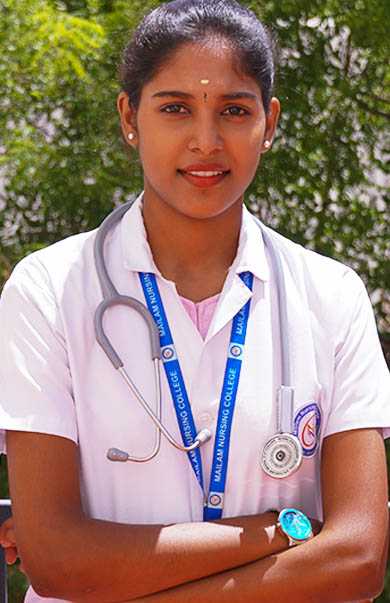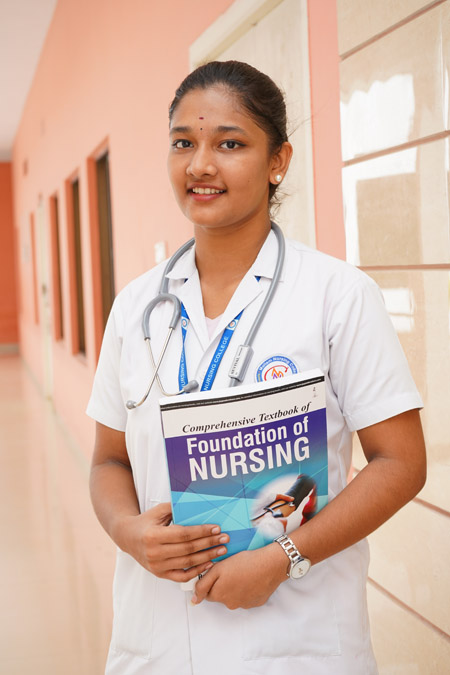
Introduction
The field of healthcare has always been at the forefront of societal importance, and nursing, as an integral part of healthcare, plays a crucial role in patient care and well-being. If you have a passion for helping others and a desire to make a positive impact on people’s lives, pursuing a Bachelor of Science in nursing degree can be your career choice.
B.Sc. Nursing course is designed to equip students with the knowledge, skills, and competencies necessary to provide comprehensive healthcare services. B.Sc. Nursing degree, you can become a registered nurse (RN) and work in hospitals, clinics, community health centers, research institutions, and even pursue advanced studies in specialized areas.
AIMS
- Prepare graduates to assume responsibilities as professionals, competent nurses and midwives in providing promotive, preventive, curative, and rehabilitative services.
- Prepare nurses who can make independent decisions in nursing situations, protect the rights of and facilitate individuals and groups in pursuit of health, functions in the hospital, community nursing services, and conduct research studies in the areas of nursing practice. They are also expected to assume the role of teacher, supervisor, and manager in a clinical / public health settings.

Objectives
On completion of four years B.Sc. Nursing Program the graduate will be able to:
- Apply knowledge from physical, biological, and behavioral sciences, medicine including alternative systems, and nursing in providing nursing care to individuals, families, and communities.
- Demonstrate an understanding of lifestyles and other factors, which affect the health of individuals and groups.
- Provide nursing care based on steps of the nursing process in collaboration with individuals and groups.
- Demonstrate critical thinking skills in making decisions in all situations in order to provide quality care.
- Utilize the latest trends and technology in providing health care.
- Provide promotive, preventive, and restorative health services in line with National Health Policies and Programmes.
- Practice within the framework of the code of ethics and professional conduct, and acceptable standards of practice within the legal boundaries.
- Communicate effectively with individuals and groups, and members of the health team in order to promote effective interpersonal relationships and teamwork.
- Demonstrate skills in teaching individuals and groups in clinical and community health settings.
- Participate effectively as members of the health team in the health care delivery system.
- Demonstrate leadership and managerial skills in clinical / community health settings.
- Conduct need-based research studies in various settings and utilize the research findings to improve the quality of care.
- Demonstrate awareness, interest, and contribute towards the advancement of self and of the profession.
Program Curriculum and Course Framework
B.Sc. Nursing program typically span over a period of four years, comprising both theoretical and practical training. The course is designed to provide a solid foundation in healthcare sciences while emphasizing the development of clinical skills through hands-on training in various healthcare settings.
Practical Training and Hands-On Experience
One of the highlights of B.Sc. Nursing program is an emphasis on clinical training and experiential learning. Students have the opportunity to gain practical experience by working alongside healthcare professionals in hospitals and healthcare institutions. This hands-on training allows students to apply theoretical knowledge, develop critical thinking skills, and enhance their ability to provide holistic patient care. It also helps inculcate qualities such as compassion, empathy, and effective communication, which are vital in nursing practice.
Eligibility for Admission – Annual Pattern
Candidates should have a pass in the higher secondary examination (Academic) conducted by the board of Higher Secondary Examination of Tamil Nadu, or any other equivalent examination accepted by the university, there to with a minimum of 50% marks (40% marks for SC, ST, MBC, OBC candidates) in part-III subjects of Physics, Chemistry & Biology/Botany & Zoology) and should have English as one of the subjects. The candidate shall be medically fit.
Eligibility for Admission – Semester Pattern

Age Limit
The minimum age for admission shall be 17 years on 31st December of the year in which admission is sought. The maximum age limit for admission shall be 35 years.
Minimum Educational Qualification
Candidates with Science who have passed the qualifying 12th Standard examination (10+2) and must have obtained a minimum of 45% marks in Physics, Chemistry, and Biology taken together and passed in English individually.
English is a compulsory subject in 10+2 for being eligible for admission to B.Sc. (Nursing).
Candidates are also eligible for State Open Schools recognized by the State Government and the National Institute of Open Schools (NIOS) recognized by the Central Government having Science subjects and English only.
- Colour-blind candidates are eligible provided that Colour corrective contact lenses and spectacles are worn by such candidates.
- The candidate shall be medically fit.
- Married candidates are also eligible for admission.
- Students shall be admitted once a year.
Entrance Examination
Selection of candidates should be based on the merit of the entrance examination. Entrance test** shall comprise of:
a) Aptitude for Nursing 20 marks
b) Physics 20 marks
c) Chemistry 20 marks
d) Biology 20 marks
e) English 20 marks
Minimum Qualifying Criteria
Minimum qualifying criteria of entrance test to admission to B.Sc. Nursing is under:
General 50th percentile
SC/ST/OBC 40th percentile
General – PwD 45th percentile
SC/ST/OBC PwD 40th percentile
**Entrance test shall be conducted by University/State Government.
Reservation Policy
Reservation of seats in for admission in Nursing Colleges for SC/ST/OBC/EWSs/PH
Admission under the reserved quota shall be subject to reservation policy and eligibility criteria for SC/ST/OBC/EWSs prescribed by the Central Govt./State Govt./Union Territory as applicable to the College concerned.
In respect of candidates belonging to SC/ST/OBC the marks obtained in 3 subjects – Physics, Chemistry, Biology shall be 40% and passed in English individually.
Reservation for disability
5% Disability reservation to be considered for disabled candidates with a disability of loco-motor to the tune of 40% to 50% of the lower extremity and other eligibility criteria with regard to qualification will be same as prescribed for General category candidates. The upper age limit shall be relaxed by 5 years for disabled candidates.
Note: A committee to be formed consisting of medical officer authorized by medical board of State government and a nursing expert in the panel which may decide whether the candidates have the disability of loco-motor to the tune of 40% to 50%
Note:
- Reservations shall be applicable within the sanctioned number of seats.
- The start of the semester shall be 1st August every year.
- No admission after the cut-off date i.e. 30th September will be undertaken. Further Hall Tickets/Admit Card shall not be issued to the candidates who are admitted after 30th September.
- The responsibility of obtaining and verifying the requisite documents for admission lies with the Institution and University.
Foreign Nationals
The entry qualification equivalency i.e., 12th standard will be obtained by Association of Indian Universities, New Delhi. Institution, SNRC and University will be responsible to ensure that the qualification and eligibility will be equivalent to what has been prescribed by the Council.

Career Paths and Progression
The demand for skilled nurses is consistently high, making nursing one of the most promising and stable career paths. With a B.Sc. Nursing degree, you can pursue diverse career options such as staff nurse, clinical nurse specialist, nurse educator, nurse researcher, nurse manager, and nurse administrator, to name a few. Moreover, specialized areas like critical care, oncology, geriatrics, and pediatric nursing offer further opportunities for specialization and career advancement. Nursing also provides a global job market, allowing nurses to work in different countries and explore new cultures and healthcare systems.
Continuous Growth and Advancement
Pursuing a B.Sc. Nursing degree not only offers a rewarding career but also promotes personal and professional growth. The field of nursing provides immense opportunities for continuous learning and development. Nurses can engage in postgraduate studies, pursue advanced certifications, and attend workshops and conferences to stay updated with the latest advancements in healthcare. Furthermore, nursing is a profession that allows for professional mobility, enabling nurses to explore different areas of practice and contribute to healthcare policy and advocacy.
B.Sc. Nursing degree opens the door to a fulfilling and dynamic healthcare career. With a comprehensive curriculum, hands-on clinical training, and diverse career opportunities, nursing offers a pathway to make a tangible difference in the lives of individuals and communities. If you have a passion for serving others, a commitment to lifelong learning, and a desire to be part of a noble profession, pursuing a B.Sc. Nursing degree can be an excellent choice that combines personal fulfillment, job security, and the opportunity to contribute to the well-being of society.

